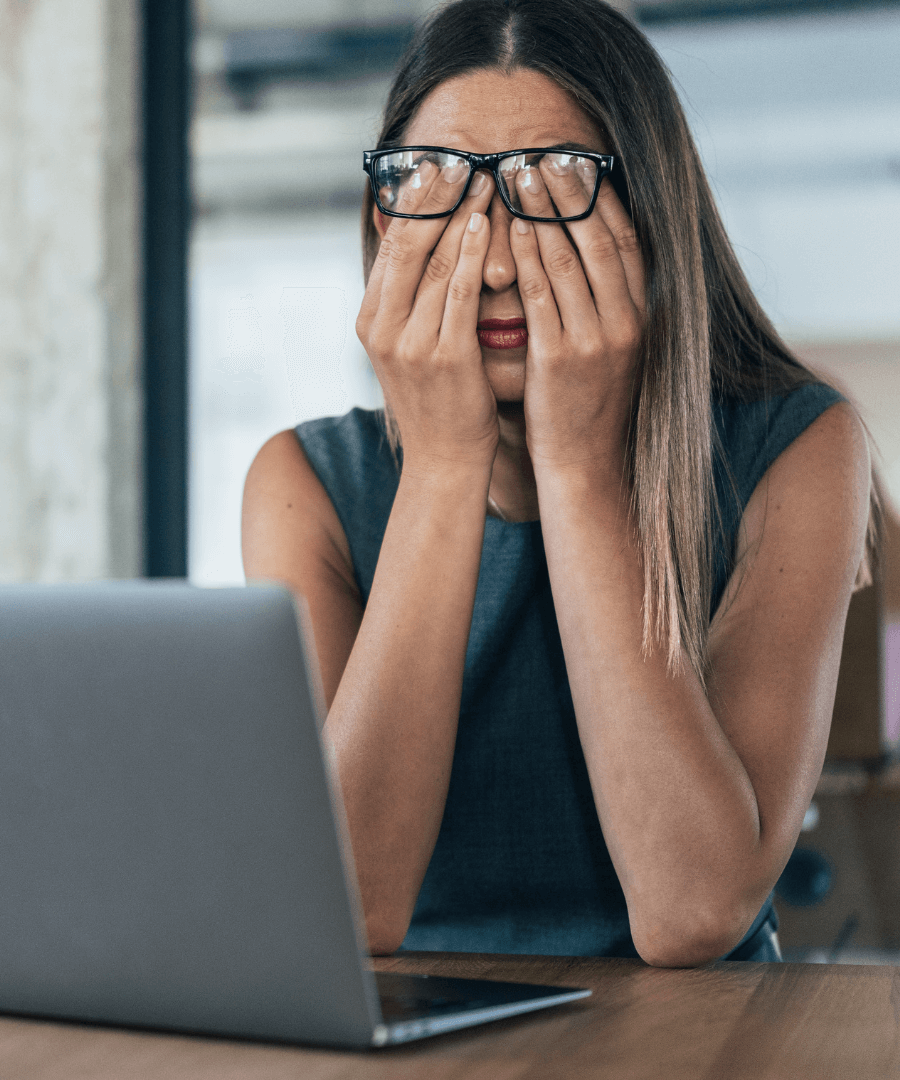Fatigue is a tricky symptom because it can be attributed to many different causes. Tiredness every once in a while after a sleepless night is no reason for alarm, but if you daydream about a nap or struggle to wake up in the morning, it's time to take another look.
Women (and even health care professionals) are especially notorious for brushing fatigue off as a "normal" part of life—family responsibilities, jobs, and juggling life in general can make it seem like low energy levels are just part of the daily grind. But don't be deceived—low energy is a sign your body needs attention.
It's essential to meet with a doctor to rule out potential medical reasons, but diet and lifestyle can also contribute to low energy levels in females. Here we'll examine the most common causes of low energy in females, plus steps you can take now to boost your energy levels in a healthy and sustainable way.
Causes Of Low Energy Levels In Females
Health conditions or lifestyle (or both) can contribute to low energy levels in females. Here are some of the most common causes:
Poor Sleep
Lack of sleep may seem the most obvious, but it's still worth mentioning. Most adults need seven to nine hours of sleep each night.1 Too little (or even too much) sleep can make you feel exhausted and seriously impact day-to-day life.
Let's face it, everything feels harder when you're not getting enough sleep. Plus, sleep deprivation increases the risk of metabolic issues like blood sugar dysregulation, undesired weight gain, depression, and even low immune function.2
Thyroid Health
Your thyroid, the tiny butterfly-shaped gland in the front of your neck, plays an integral role in metabolism, directly affecting energy levels.3 Thyroid hormones control your body's metabolism, so an underactive thyroid (hypothyroidism) translates to many symptoms, and a big one is fatigue.
On the other hand, an overactive thyroid (hyperthyroid)—where the thyroid gland is working on overdrive—can speed you up until you crash. Women are five to eight times more likely to be diagnosed with a thyroid disorder than men, making it an important factor to consider when assessing low energy.4
Eating Habits
Energy levels can be significantly impacted by what and how much you eat. Diets high in sugar or processed foods can adversely affect energy levels.5 Eating foods low in fiber, like white bread or baked goods, can spike your blood sugar, causing an initial energy boost but usually leaving you exhausted mid-afternoon.
Low-nutrient meals can also zap energy because you're not getting the essential minerals and vitamins your body needs to function optimally. Skipping meals or not eating enough can also have an effect. If you're not eating enough in general, your body is low on fuel and won't be able to function at its best. Or you'll end up hungry and overeating at your next meal, which makes you feel even worse.
Heart Disease
Not-so-fun fact: Even though heart disease is the number one cause of death for women, it's often called a silent killer because the warning signs look different than for men.6 Aside from shortness of breath, nausea, and vomiting, tiredness can be a subtle sign. A heart not pumping enough blood to organs and muscles can leave you tired and low on energy.
No Physical Activity
It may sound counterintuitive, but moving more can actually give you more energy. Exercise supports brain health and helps release mood-lifting endorphins.7 It also improves sleep and reduces stress-related fatigue—both significant factors for energy levels.8
Stress
Chronic stress depletes energy levels by forcing your body to work in overdrive. Cortisol, one of the hormones released when we're stressed, can have a significant impact on energy levels. Cortisol keeps us alert and awake, but too much of it can lead to burnout and exhaustion.9
Stress can also interfere with sleep and adversely impact your mood, further sabotaging your energy levels.10 It also contributes to high blood sugar levels, which can throw off energy even more.
Body Size
Not everyone in a larger body feels low on energy, but sometimes carrying more weight can impact energy levels in women. Sleep apnea, a condition where breathing temporarily stops during sleep, is more common in people with higher body weights (although anyone can develop sleep apnea).11
Sleep apnea can cause low energy levels due to interrupted and low-quality sleep. It increases the risk of other health issues like heart disease, diabetes, and depression which can also lead to low energy.12,13
Hormones
Hormone imbalances, specifically sex hormones like estrogen and progesterone, can impact energy by affecting metabolism, mood, and sleep. Low testosterone—women need testosterone too—can contribute to low energy (among many other symptoms).14
Heavy periods (which can be caused by several reasons, but one can be higher estrogen and lower progesterone) can also lead to iron deficiency anemia. Iron deficiency anemia means low levels of healthy red blood cells, which can cause low energy and fatigue.15
Menopause
Menopause is also about hormones, but worth mentioning on its own. Menopause means a woman no longer gets her period, but the years leading up to menopause (perimenopause) are characterized by significant hormone fluctuations.16 Changes in progesterone and estrogen can lead to symptoms like hot flashes and night sweats that interrupt sleep, and (you guessed it) low energy.
Depression
Depression is a complex interplay of low mood, energy, and motivation; they are all related and can affect each other.17 Depression can make it hard to get out of bed and stop you from participating in activities that used to bring joy.
Sometimes depression can be accompanied by insomnia, a sleep disorder that makes it difficult to fall asleep, stay asleep, or wake up too early. This leaves you feeling exhausted because you aren't sleeping well. Researchers aren't entirely sure why depression increases fatigue but believe that inflammation and low levels of neurotransmitters such as serotonin and dopamine are partly to blame.18
If you struggle with mental health concerns, you aren't alone; there are resources to help.
How To Improve Your Energy Levels Naturally
Now you know some of the causes of fatigue, so what can you do about it? Here are tips you can implement starting today:
Exercise
Since physical activity can boost energy, it's time to get up and get going. Move your body daily, even if it's just a short walk around the block. It helps to ditch the all-or-nothing mentality—if you've got five minutes, that's a good start! Even small bursts of activity or a post-lunch walk can help with fatigue (plus, it's good for your blood sugar, mood, and productivity).

Choose Nutrient-Dense Foods
Nutrients provide fuel for your body and reduce the risk of chronic illness, which can lead to low energy. Pair satiating proteins and fats with low-glycemic carbs like vegetables or berries for slow, sustainable energy. If you have a treat, eat something high in fiber first to avoid a low blood sugar crash.
Cut Back on Alcohol And Quit Smoking
There's not much to be said about smoking that hasn't already been said. Most people who smoke know the dangers, but it's worth mentioning that smoking can also increase fatigue.19 If you need help quitting, there are programs to help you.
Drinking alcohol before bed may help you feel relaxed and even help you fall asleep more quickly, but the problem is that it usually leads to low-quality sleep.20 Experiment with what feels good for your body. If you typically drink three glasses of wine, maybe cut back to one a day. Or save it for weekends or special occasions.
Address Stress
Stress is part of being human. Life is busy, and we all have different stress thresholds—but we can work to manage stress better. What's your stressor? Is it work or family? Is it time constraints? Once you figure out what's causing the stress, take steps to address it. This can look like saying no more, creating a schedule and sticking to it, learning how to delegate, or speaking up.
You can also work on stress management techniques like deep breathing, journaling, and mindfulness. If you're really feeling low, don't be afraid to reach out for help. Talking to a therapist, coach, or friend can be incredibly helpful.
Limit Sugar Intake
That afternoon slump may make sugary snacks sound good to get a quick boost of energy, but it'll backfire in the long run. Replace sugar with low-glycemic foods like low-sugar fruits, dark leafy greens, whole grains, and healthy fats for more energy throughout the day. Plus, you’ll have a better mood and blood sugar balance.
Drink More Water
Water doesn't necessarily directly impact energy levels, but staying hydrated is essential for your overall health. Every cell in your body is affected by hydration, and being even slightly dehydrated can make you tired.21 A good goal is to aim for eight to ten glasses a day or half your body weight in ounces a day (so if you weigh 150 lbs, aim for 75 ounces daily).
Learn More About How to Increase Energy Levels and Improve Your Overall Health With Signos
You're told to personalize your diet and lifestyle choices to your needs, but how do you know what is best for you? Sometimes it takes trial and error, but you can also use tools like a continuous glucose monitor (CGM) to help. A CGM can give insight into how your diet and lifestyle choices affect your energy levels.
When you pair a CGM with the Signos app, you can see how energy levels may be related to the food you eat and your lifestyle choices (assuming you've ruled out medical conditions). The data can identify what works for you and what doesn't, so you can make empowered decisions for weight loss, long-term health, and more.
Curious to learn more? Take this quick three-minute quiz to find out if Signos is a good fit for you.
- Item 1
- Item 2
- item 3
Topics discussed in this article:
References
- Watson, N. F., Badr, M. S., Belenky, G., Bliwise, D. L., Buxton, O. M., Buysse, D., Dinges, D. F., Gangwisch, J., Grandner, M. A., Kushida, C., Malhotra, R. K., Martin, J. L., Patel, S. R., Quan, S. F., & Tasali, E. (2015). Recommended Amount of Sleep for a Healthy Adult: A Joint Consensus Statement of the American Academy of Sleep Medicine and Sleep Research Society. Sleep, 38(6), 843–844. https://doi.org/10.5665/sleep.4716
- Cedernaes, J., Schiöth, H. B., & Benedict, C. (2015). Determinants of shortened, disrupted, and mistimed sleep and associated metabolic health consequences in healthy humans. Diabetes, 64(4), 1073–1080. https://doi.org/10.2337/db14-1475
- Teixeira, P. F. D. S., Dos Santos, P. B., & Pazos-Moura, C. C. (2020). The role of thyroid hormone in metabolism and metabolic syndrome. Therapeutic advances in endocrinology and metabolism, 11, 2042018820917869. https://doi.org/10.1177/2042018820917869
- https://www.thyroid.org/media-main/press-room/
- Azzolino, D., Arosio, B., Marzetti, E., Calvani, R., & Cesari, M. (2020). Nutritional Status as a Mediator of Fatigue and Its Underlying Mechanisms in Older People. Nutrients, 12(2), 444. https://doi.org/10.3390/nu12020444
- https://www.cdc.gov/heartdisease/women.htm
- Di Liegro, C. M., Schiera, G., Proia, P., & Di Liegro, I. (2019). Physical Activity and Brain Health. Genes, 10(9), 720. https://doi.org/10.3390/genes10090720
- de Vries, J. D., van Hooff, M. L., Geurts, S. A., & Kompier, M. A. (2016). Exercise as an Intervention to Reduce Study-Related Fatigue among University Students: A Two-Arm Parallel Randomized Controlled Trial. PloS one, 11(3), e0152137. https://doi.org/10.1371/journal.pone.0152137
- Salvagioni, D. A. J., Melanda, F. N., Mesas, A. E., González, A. D., Gabani, F. L., & Andrade, S. M. (2017). Physical, psychological and occupational consequences of job burnout: A systematic review of prospective studies. PloS one, 12(10), e0185781. https://doi.org/10.1371/journal.pone.0185781
- Kalmbach, D. A., Anderson, J. R., & Drake, C. L. (2018). The impact of stress on sleep: Pathogenic sleep reactivity as a vulnerability to insomnia and circadian disorders. Journal of sleep research, 27(6), e12710. https://doi.org/10.1111/jsr.12710
- Jehan, S., Zizi, F., Pandi-Perumal, S. R., Wall, S., Auguste, E., Myers, A. K., Jean-Louis, G., & McFarlane, S. I. (2017). Obstructive Sleep Apnea and Obesity: Implications for Public Health. Sleep medicine and disorders : international journal, 1(4), 00019.
- Knauert, M., Naik, S., Gillespie, M. B., & Kryger, M. (2015). Clinical consequences and economic costs of untreated obstructive sleep apnea syndrome. World journal of otorhinolaryngology - head and neck surgery, 1(1), 17–27. https://doi.org/10.1016/j.wjorl.2015.08.001
- Jehan, S., Auguste, E., Pandi-Perumal, S. R., Kalinowski, J., Myers, A. K., Zizi, F., Rajanna, M. G., Jean-Louis, G., & McFarlane, S. I. (2017). Depression, Obstructive Sleep Apnea and Psychosocial Health. Sleep medicine and disorders : international journal, 1(3), 00012.
- Alemany M. (2022). The Roles of Androgens in Humans: Biology, Metabolic Regulation and Health. International journal of molecular sciences, 23(19), 11952. https://doi.org/10.3390/ijms231911952
- Kocaoz, S., Cirpan, R., & Degirmencioglu, A. Z. (2019). The prevalence and impacts heavy menstrual bleeding on anemia, fatigue and quality of life in women of reproductive age. Pakistan journal of medical sciences, 35(2), 365–370. https://doi.org/10.12669/pjms.35.2.644
- Taylor-Swanson, L., Wong, A. E., Pincus, D., Butner, J. E., Hahn-Holbrook, J., Koithan, M., Wann, K., & Woods, N. F. (2018). The dynamics of stress and fatigue across menopause: attractors, coupling, and resilience. Menopause (New York, N.Y.), 25(4), 380–390. https://doi.org/10.1097/GME.0000000000001025
- Corfield, E. C., Martin, N. G., & Nyholt, D. R. (2016). Co-occurrence and symptomatology of fatigue and depression. Comprehensive psychiatry, 71, 1–10. https://doi.org/10.1016/j.comppsych.2016.08.004
- Lee, C. H., & Giuliani, F. (2019). The Role of Inflammation in Depression and Fatigue. Frontiers in immunology, 10, 1696. https://doi.org/10.3389/fimmu.2019.01696
- Corwin, E. J., Klein, L. C., & Rickelman, K. (2002). Predictors of fatigue in healthy young adults: moderating effects of cigarette smoking and gender. Biological research for nursing, 3(4), 222–233. https://doi.org/10.1177/109980040200300407
- Colrain, I. M., Nicholas, C. L., & Baker, F. C. (2014). Alcohol and the sleeping brain. Handbook of clinical neurology, 125, 415–431. https://doi.org/10.1016/B978-0-444-62619-6.00024-0
- Pross, N., Demazières, A., Girard, N., Barnouin, R., Santoro, F., Chevillotte, E., Klein, A., & Le Bellego, L. (2013). Influence of progressive fluid restriction on mood and physiological markers of dehydration in women. The British journal of nutrition, 109(2), 313–321. https://doi.org/10.1017/S0007114512001080
-
































